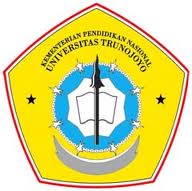Anda belum Log-in!
Silahkan Log in
Selamat Datang di Portal Digital Content Publisher
Minggu , 16 November 2025
Perpustakaan sebagai jantung pendidikan tinggi di Indonesia, harus mampu memberi kontribusi yang berarti bagi pelaksanaan proses belajar mengajar di perguruan tinggi.
di-posting oleh 090311100037 pada 2014-08-13 11:55:28 • 750 klik
HUBUNGAN AGROEKOLOGI DENGAN POTENSI SUMBER KARBOHIDRAT UMBI – UMBIAN LOKAL DIBAWAH PERMUKAAN TANAH PADA LAHAN KERING DI KABUPATEN BANGKALAN
Agroecology Relationships with Potential Sources of Carbohydrates Bulbs - Local Roots Below the Soil Surface on Dry Land the District Bangkalan
disusun oleh JAMALUDDIN HUSEN
| Subyek: | Analisis vegetasi Agroekologi Potensi umbi – umbian |
| Kata Kunci: | Analisis vegetasi Agroekologi Potensi umbi – umbian |
[ Anotasi Abstrak ]
Karbohidrat merupakan sumber energi penting bagi tubuh manusia untuk melakukan aktivitas sehari – hari dan berperan penting dalam proses metabolisme pada tubuh. Penelitian ini bertujuan untuk mengetahui hubungan agroekologi dengan potensi umbi – umbian penghasil sumber karbohidrat dibawah permukaan tanah pada lahan kering di Kabupaten Bangkalan. Penelitian ini dilakukan di sepuluh Kecamatan diantaranya Burneh, Tanah Merah, Galis, Modung, Blega, Konang, Geger, Kokop, Sepuluh, dan Klampis dengan mengunakan metode survei kemudian untuk penetapan stasiun pengamatan dengan metode Purposive Sampling. Variabel agroekologi dalam penelitian ini yaitu curah hujan, intensitas cahaya, kadar air, dan porisitas total. Hasil potensi umbi – umbian rerata tertinggi terdapat pada jenis tanaman umbi talas yaitu 3760,8 kg/Ha, sedangkan rerata terendah terdapat pada umbi suweg sebesar 2,04 kg/Ha. Hasil analisis hubungan potensi umbi talas dengan agroekologi Kabupaten Bangkalan sesuai dengan Indsek nilai penting yang tertinggi maka diperoleh hasil uji regresi yaitu Y = - 0.774 + 0,431(X1) – 0,080 (X2) + 1,555 (X3) + 0,184 (X4) dan nilai koefisiensi determinasi (R2) sebesar 0.161 %. Menjelaskan bahwa variabel independen (kadar air, curah hujan,intensitas cahaya, dan porositas total) mampu menjelaskan variabel dependen sebesar 16 %, sedangkan sisanya sebesar 84 % dijelaskan variabel lainnya.
Deskripsi Lain
Carbohydrate are an important energy resources for human body to do something activity every day and contribute in metabolic processes in the body. This experiments aims to know the relations of the potential agroecology tubers-producing carbohydrate source below the ground surface on dry land Bangkalan. This research was conducted in ten subdistrict of Bangkalan city, namely: Burneh, Tanah Merah, Galis, Modung, Blega, Konang, Geger, Kokop, Sepuluh, and Klampis by using survey method for determining of observations stations with Purposive sampling method. Agroecology variables in this research are precipitation, light intensity, water content, and total porosity. The results of potential tubers are the highest of taro plants tubres type , this is 3760.8 kg / ha, while the lowest is suweg tuber 2.04 kg / ha. The results of the analysis about the relations of potential taro tubers and agroecology based on the indeks of important value in Bangkalan that the results of test regression is Y = - 0.774 + 0.431 (X1) - 0.080 (X2) + 1.555 (X3) + 0.184 (X4) and the value of coefficient determination (R2) is 0.161%. Its explained that the independent variable (water content, precipitation, light intensity, and total porosity) able to show the dependent variable is 16%, while the residue is 84% described other variables. Key words: Vegetation analysis, Agroecology, Potential tubers.
| Kontributor | : MUSTIKA TRIPATMASARI SP. M.Si; Ir. SUHARTONO. MP |
| Tanggal tercipta | : 2014-07-02 |
| Jenis(Tipe) | : Text |
| Bentuk(Format) | |
| Bahasa | : Indonesia |
| Pengenal(Identifier) | : TRUNOJOYO-Tugas Akhir-5691 |
| No Koleksi | : 090311100037 |
Ketentuan (Rights) :
2014
 Download File Penyerta (khusus anggota terdaftar)
Download File Penyerta (khusus anggota terdaftar) 1. TRUNOJOYO-Tugas Akhir-5691-090311100037_ABSTRAK_TOC.pdf - 322 KB
1. TRUNOJOYO-Tugas Akhir-5691-090311100037_ABSTRAK_TOC.pdf - 322 KB 2. TRUNOJOYO-Tugas Akhir-5691-090311100037_C0VER.pdf - 1175 KB
2. TRUNOJOYO-Tugas Akhir-5691-090311100037_C0VER.pdf - 1175 KB 3. TRUNOJOYO-Tugas Akhir-5691-090311100037_Chapter1.pdf - 83 KB
3. TRUNOJOYO-Tugas Akhir-5691-090311100037_Chapter1.pdf - 83 KB 4. TRUNOJOYO-Tugas Akhir-5691-090311100037_Chapter2.pdf - 111 KB
4. TRUNOJOYO-Tugas Akhir-5691-090311100037_Chapter2.pdf - 111 KB 5. TRUNOJOYO-Tugas Akhir-5691-090311100037_Chapter3.pdf - 266 KB
5. TRUNOJOYO-Tugas Akhir-5691-090311100037_Chapter3.pdf - 266 KB 6. TRUNOJOYO-Tugas Akhir-5691-090311100037_Chapter4.pdf - 473 KB
6. TRUNOJOYO-Tugas Akhir-5691-090311100037_Chapter4.pdf - 473 KB 7. TRUNOJOYO-Tugas Akhir-5691-090311100037_Conclusion.pdf - 151 KB
7. TRUNOJOYO-Tugas Akhir-5691-090311100037_Conclusion.pdf - 151 KB 8. TRUNOJOYO-Tugas Akhir-5691-090311100037_References.pdf - 163 KB
8. TRUNOJOYO-Tugas Akhir-5691-090311100037_References.pdf - 163 KB 9. TRUNOJOYO-Tugas Akhir-5691-Appendices.pdf - 863 KB
9. TRUNOJOYO-Tugas Akhir-5691-Appendices.pdf - 863 KB 10. TRUNOJOYO-Tugas Akhir-5691-090311100037_ABSTRAK_TOC.pdf - 322 KB
10. TRUNOJOYO-Tugas Akhir-5691-090311100037_ABSTRAK_TOC.pdf - 322 KB 11. TRUNOJOYO-Tugas Akhir-5691-090311100037_C0VER.pdf - 1175 KB
11. TRUNOJOYO-Tugas Akhir-5691-090311100037_C0VER.pdf - 1175 KB 12. TRUNOJOYO-Tugas Akhir-5691-090311100037_Chapter1.pdf - 83 KB
12. TRUNOJOYO-Tugas Akhir-5691-090311100037_Chapter1.pdf - 83 KB 13. TRUNOJOYO-Tugas Akhir-5691-090311100037_Chapter2.pdf - 111 KB
13. TRUNOJOYO-Tugas Akhir-5691-090311100037_Chapter2.pdf - 111 KB 14. TRUNOJOYO-Tugas Akhir-5691-090311100037_Chapter3.pdf - 266 KB
14. TRUNOJOYO-Tugas Akhir-5691-090311100037_Chapter3.pdf - 266 KB 15. TRUNOJOYO-Tugas Akhir-5691-090311100037_Chapter4.pdf - 473 KB
15. TRUNOJOYO-Tugas Akhir-5691-090311100037_Chapter4.pdf - 473 KB 16. TRUNOJOYO-Tugas Akhir-5691-090311100037_Conclusion.pdf - 151 KB
16. TRUNOJOYO-Tugas Akhir-5691-090311100037_Conclusion.pdf - 151 KB 17. TRUNOJOYO-Tugas Akhir-5691-090311100037_References.pdf - 163 KB
17. TRUNOJOYO-Tugas Akhir-5691-090311100037_References.pdf - 163 KB 18. TRUNOJOYO-Tugas Akhir-5691-Appendices.pdf - 863 KB
18. TRUNOJOYO-Tugas Akhir-5691-Appendices.pdf - 863 KB Dokumen sejenis...
Dokumen sejenis...Tidak ada !
 Dokumen yang bertautan...
Dokumen yang bertautan... Kembali ke Daftar
Kembali ke Daftar 